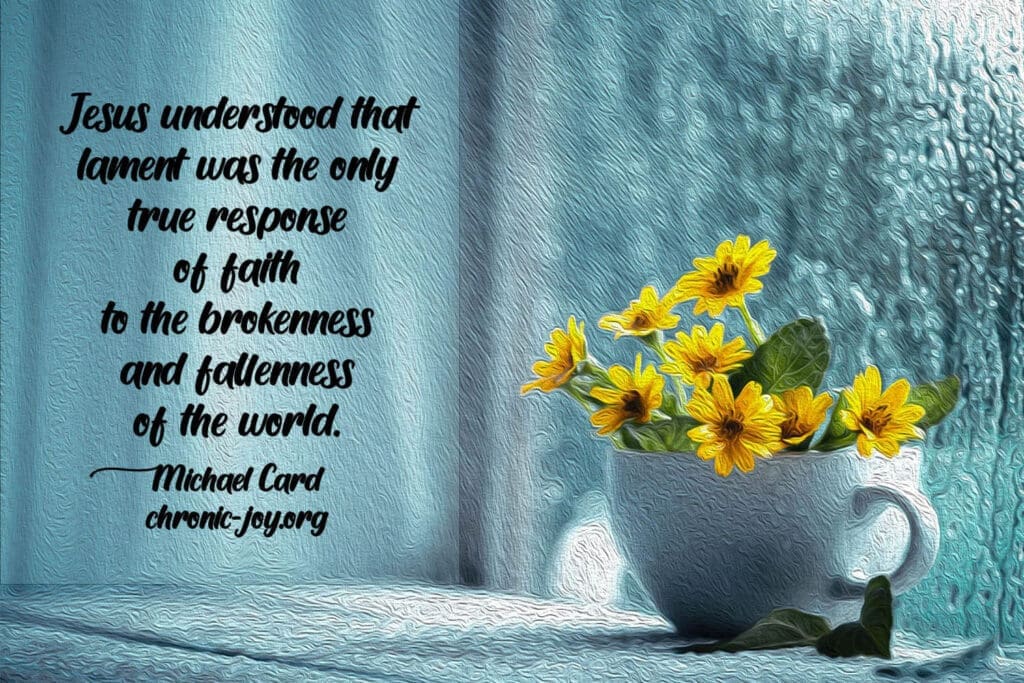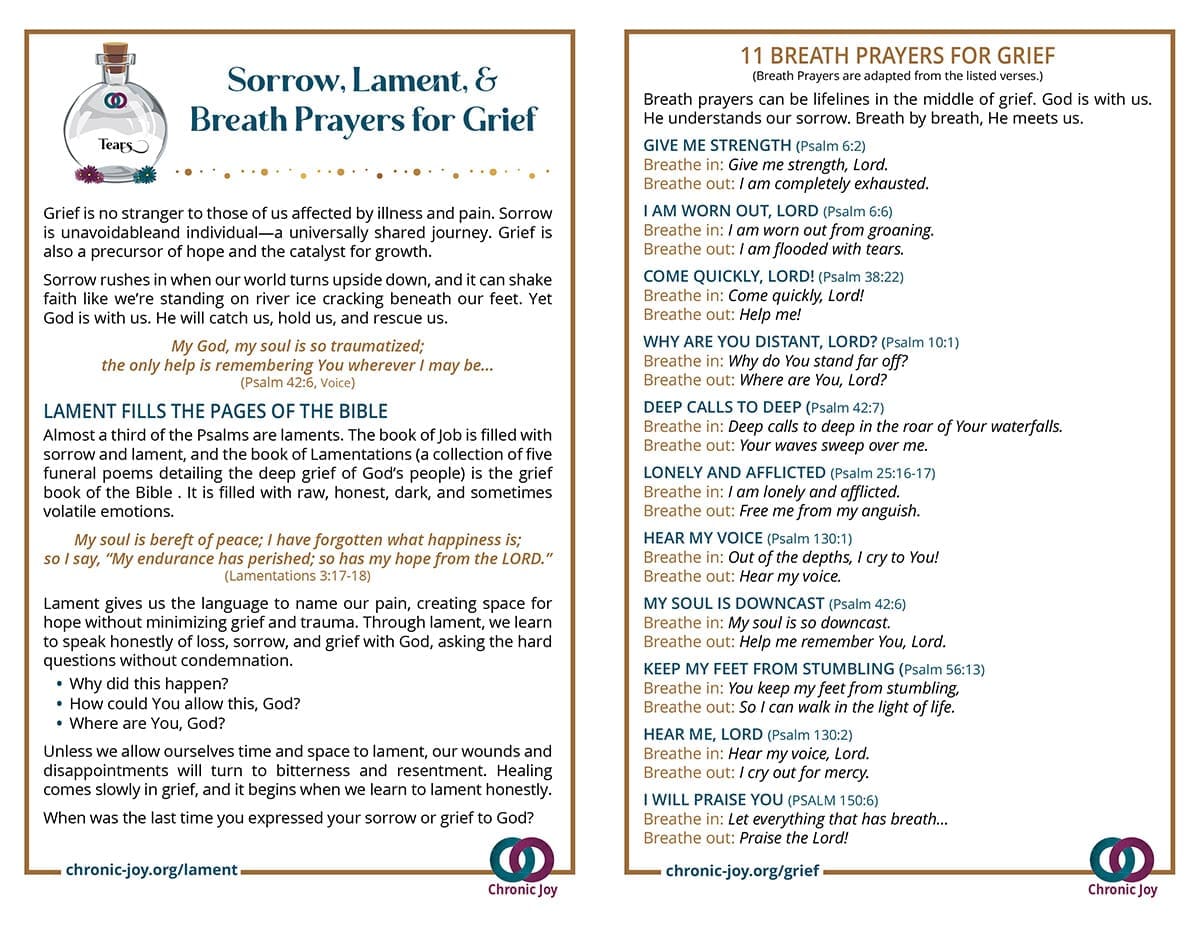
“Jesus understood that lament was the only true response of faith to the brokenness and fallenness of the world. ” Michael Card
Trust in him at all times, you people; pour out your hearts before him. God is our refuge. (Psalm 62:8)
THE LANGUAGE OF LAMENT
There was hardly a dry eye in the room. One by one, men and women got up to read a lament they had written. There were tears as we lamented for enslaved girls, parents, and grandparents who had lost children, for some who were depressed and thought there was no reason to live, for those being persecuted all over the world, for a world that does not know God.
We allowed each other into the hidden places of our hearts, where we had been holding on to our pain.
In July 2016, my husband, oldest son, and I attended “Recovering the Lost Language of Lament,” a 5-Day Intensive Bible Training Seminar taught by Michael Card. We focused on the lives of Job, Jeremiah, David, and Jesus and read some of their laments in the Bible.
Michael Card’s book, A Sacred Sorrow: Reaching Out to God in the Lost Language of Lament, covers what we learned and encourages readers to include lament in their prayer life, offering God their pain and sorrow as acts of worship. Here are two quotes from Chapter 4:
“It is supreme honesty before a God whom my faith tells me I can trust. He encourages me to bring everything as an act of worship – my disappointment, my frustration, and even my hate. Only lament uncovers this kind of new faith, a biblical faith that better understands God’s heart as it is revealed through Jesus Christ.”
“Jesus understood that lament was the only true response of faith to the brokenness and fallenness of the world.”
LAMENT IS A FORM OF WORSHIP
Lament usually starts with a plea for God to listen and a longing for God’s presence, followed by questions, complaints, or anger. Then comes a turning point where the writer focuses on God, remembering who He is and what He has done. The lament then ends with praise.
My grief was fresh because my mom had passed away three months before this seminar. Some family members were facing devastating circumstances as well. My heart ached for them and for others who were turning away from God. Carrying these burdens, I was drawn to the theme of lament.
During that week, Michael Card’s teaching helped me realize that offering my burdens to God was a way to worship Him. God knows our hearts. Nothing is hidden from Him. He is not afraid of our complaints, questions, or even anger. We give our pain, heartaches, and doubts as offerings to God because we will not experience His peace until we let them go.
On the fourth day of the seminar, we were all encouraged to write laments to share in the closing service. This is one of mine:
Father, hear my prayer.
Arguments, false accusations
Deception, lies, and hurt
Some dear ones are reeling
My heart is in pain for them
Where are you, Lord?
I cry unto you
Some things worsen, yet I want to
believe You will answer
Please give aid to my loved ones
Bring back those who’ve turned away
Lord, my heart aches.
I’m lost without You
Please don’t ever leave me, oh Lord
I long for You, my God
Your Word brings peace to my soul
Your Presence comforts my heart
You are my refuge
Thank You for always loving me
In truth and faithfulness
You, oh God, are above all
My hope is in You alone
A SERVICE OF LAMENT
Our last session was a service of lament divided into three parts, each beginning with scripture.
- The world at large
- Family/Community
- Personal
Michael Card began with a song, after which someone sounded a shofar. Next, a woman sang the Shema – Hear, O Israel, the LORD is our God, the LORD is one. Then, a psalm of lament was read, and many of us shared our laments.
We wept together as we poured out our hearts before God. It was a beautiful service, demonstrating how lament can be an integral part of our worship. We ended with praise to God as we sang the hymn Great is Thy Faithfulness.
My grief and pain did not magically disappear, but my heart was at peace. I knew that God heard my cries and understood my suffering. I didn’t need to worry because He had it all under control. My hope and strength are in Him alone. What I learned about grief and lament at the conference was even more valuable when our son went home to be with his Savior three years later. I could affirm again that my hope and strength are in God alone.
PRAYER
Dear God, thank You for giving us Your Word, which has many examples of lament. May we remember that we can come to You with all our sorrows as an act of worship. You know what suffering is, and You have promised to always be with us. We know You understand and will give us peace and strength to face our trials. Amen.
QUESTIONS FOR REFLECTION
What burdens are you carrying? After listing them, offer them to God through lament.
How can you worship God through lament?
How has God met you in your times of sorrow and pain?
AN INVITATION
If you have questions about lament or need help beginning, I invite you to check out Chronic Joy’s Lament printable.


Gayl Wright
Content Coordinator
A grandmother but young at heart, Gayl enjoys exploring creativity through writing, poetry, nature photography, art, crocheting, and piano. She loves coffee, tea, chocolate, and jeans. Gayl has been married to Steve for nearly 50 years, with 7 children and 14 grands (some have chronic illnesses, and one son is now with Jesus). Always learning and writing from her heart about life, her desire is to know God better, glorify Him, and encourage others. She is the author of Journey into Light.

Sorrow, Lament & Grief
Grief is no stranger to those affected by chronic illness, mental illness, chronic pain, and disability. It is both a universally-shared human experience and uniquely individual.

Recent Comments